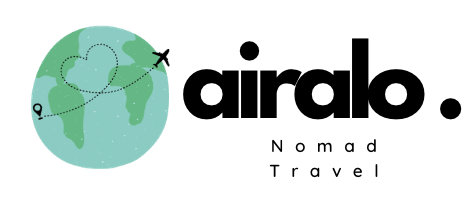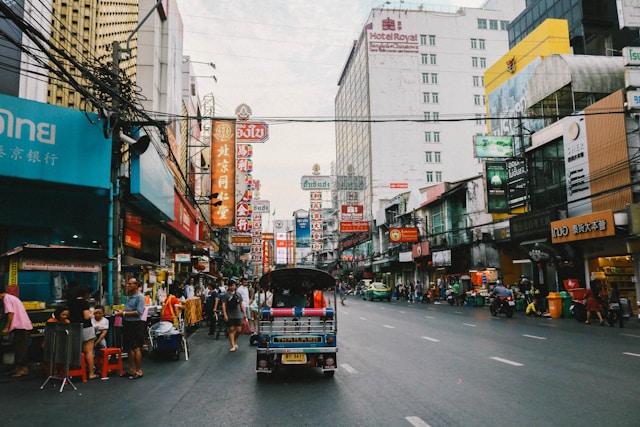
With South Korea soon launching a digital nomad visa, the possibility of choosing it as a destination for digital nomads is increasing. As this country is currently a hot topic, what is the situation in South Korea? Is it really that easy to be a digital nomad there? What challenges and difficulties do we face when choosing to be a digital nomad in South Korea? This article collects real experiences from Korean digital nomad bloggers and delves into issues such as living expenses and various challenges.
Advantages of South Korea:
1.Convenient and stable internet access
As an advanced tech-savvy country, South Korea has excellent internet infrastructure and stable network connections. This is crucial for digital nomads who heavily rely on reliable internet for remote work. In South Korea, you can easily find places with high-speed and stable internet, such as cafes, coworking spaces, or dedicated workspaces designed for digital nomads.
Of course, you can also choose to use a SIM card, as mentioned in the video “What to Expect as a Digital Nomad in Seoul, South Korea” by YouTuber Kayla Cosmos. Having a SIM card will make your experience more convenient and not limited to public Wi-Fi.
“I actually thought that when I come to Korea, I wouldn’t even need to get a SIM card because Wi-Fi would just be available everywhere. But apparently, if you don’t have a phone number, you might not be able to access some public Wi-Fi, so you need to get a SIM card to get the phone number. I did buy a SIM card, and it was about 100,000 won for three months”
2.Advanced technology and innovation environment
South Korea is an important country in the field of technology and innovation. This means that if you are involved in such work, you can be exposed to the latest technology and innovation trends in South Korea, interact with other talented professionals, and participate in innovative projects. This environment is highly attractive for digital nomads as it can foster personal career development and technological advancement.
3.Rich coffee culture and workspaces
South Korea has a unique and rich coffee culture, with cafes scattered across every corner. These cafes often provide comfortable working environments, high-speed internet, and excellent facilities, making them ideal for digital nomads to work remotely. Moreover, South Korea has many coworking spaces and startup centers specifically designed for digital nomads, offering flexible work environments and opportunities for collaboration with other entrepreneurs. These places typically provide comfortable working environments and excellent facilities to meet the needs of digital nomads. Compared to other countries, South Korea’s work culture emphasizes efficiency and professionalism, which may bring some work pressure when choosing to be a digital nomad there. However, this kind of work atmosphere also provides motivation for personal growth.
This point is highlighted in the video “What to Expect as a Digital Nomad in Seoul, South Korea” by YouTuber Kayla Cosmos, making it particularly suitable for digital nomads who enjoy working outside.
” I will say that everywhere I have stayed has great Wi-Fi, and there are a lot of cafes that you can go and sit and work at. The thing that’s really nice is, like, if you need to get up to go to the bathroom, you can leave your stuff there. You don’t have to worry about somebody stealing it. That’s so convenient and just so nice because I know there are so many countries where you cannot do that. “
4.Convenient transportation system
South Korea has a highly developed transportation system, including subways, buses, and high-speed railways. This allows digital nomads to conveniently move between cities and explore different work and living environments in various regions. Importantly, South Korea’s transportation system is also very reliable and punctual, which is crucial for digital nomads who rely on convenient transportation.
This feedback is mentioned in the video “What to Expect as a Digital Nomad in Seoul, South Korea” by YouTuber Kayla Cosmos, highlighting that public transportation in South Korea is convenient and reasonably priced. Additionally, there are options like Uber for those willing to spend a bit more.
“Now, I have yet to take a taxi or an Uber because I’m always near the metro, and I really like to rely on public transportation when I travel because it’s usually way, way cheaper than ordering a car. And every time I’ve taken public transportation, I think it’s cost about 1,000 to 2,000 won, which is mad cheap. So far, I have no complaints about that. There are so many public transportation options, and they’re all at really great prices. So I’d say in regards to that, unless you’re planning on taking a bunch of Ubers, which I don’t know, I think there’s an equivalent of Uber here, unless you’re planning on paying to have cars take you around, you should be good for most places that you’re trying to get to. If you’re relying on public transportation, you’ll save a lot of money in comparison to paying to have a driver.”
5.Diverse lifestyle and cultural experiences
South Korea offers a rich and diverse range of lifestyle and cultural experiences. You can taste a variety of international cuisines, experience traditional Korean culture, visit modern cities and shopping centers, and explore natural landscapes and hot spring resorts. These diverse experiences allow digital nomads to relax and enjoy life outside of work, fully immersing themselves in Korean culture.
Challenges of living in South Korea for digital nomads:
1.High cost of living
South Korea has a relatively high cost of living, especially in the capital city of Seoul. Rent, food, and other living expenses can be quite expensive. As a digital nomad, you’ll need to strike a balance between your budget and quality of life and be cautious with managing your finances.
In a video titled “Why Are Foreigners Leaving South Korea?” by YouTuber K Explorer, one individual mentioned leaving South Korea due to the high cost of living:
“But I also think for people who are a little bit more experienced and are looking for more, I don’t think we’re getting paid enough. And I also don’t think that we’re working enough. One thing that people really don’t talk about, and this is very recent, is that as a foreigner living here, um, there are long periods of time where you’re not working. And depending on the Visa that you’re on, I’m under an entertainment Visa, so it’s very strict on what you can and can’t do. And if you’re not working, then like you have to make sure you have an immense amount of savings or like you have family helping you out. Otherwise, you’re unfortunately just not going to be able to live as comfortably as you think you could out here. That’s kind of what made me want to move.”
In a video titled “What to Expect as a Digital Nomad in Seoul, South Korea” by YouTuber Kayla Cosmos, the issue of prices in Korea is addressed, stating that there are options within your chosen range that can help control costs.
“I would say between groceries and eating out, the price is not that vastly different. It’s a little bit cheaper, I think, to cook at home, but eating out also isn’t that expensive either. Some days, I just want to eat something very quick, and I can go to CU or 7-Eleven, and I can get a full meal for about 5,000 won, which is about three to four dollars. Sometimes, I just want a gimbap, which is nice and healthy but super delicious, and it only costs about 5,000 won. If I eat a meal out at a nice restaurant or whatever, I’m usually spending between ten thousand and twenty thousand won, which is actually pretty decent for a good-sized meal and good-quality food. So I think a lot of people expect that Korea is very expensive, but you can actually do it quite cheaply. Now, if you’re comparing it to places like Vietnam or the Philippines, then yes, it’s expensive. But a lot of the meals that I’m spending money on, if I were spending this money in the United States, the United States would probably be about double the price.”
2.Language barrier
While many people in South Korea speak English, the majority of public places and services primarily use Korean as the main language. This can pose a language barrier for digital nomads, especially when dealing with administrative tasks, communicating with locals, or troubleshooting issues. Learning some basic Korean will greatly assist you in your daily life and work.
In the video “What to Expect as a Digital Nomad in Seoul, South Korea” by YouTuber Kayla Cosmos, language issues are described:
“Now, let’s talk about language and how English-friendly it is here. I’ve noticed here in Seoul, at least, it is kind of hit or miss. If I’m at a cafe, you know, typically when I’m talking to the cashier, they’re very good at being like, “Oh, do you want hot, cold, here, to go?” And I really appreciate that I can communicate that way. But if I go to a local market and I may be talking to an older woman, then the language barrier might be there. And in that case, I’d really love to be able to, you know, say, like, “Oh, I want that. Thank you. Oh, it’s delicious,” just to make that interaction much more wholesome, even if it is just a little bit.”
3.Work pressure and cultural differences
South Korea has a unique work culture that emphasizes efficiency and professionalism. This can create work pressure for digital nomads, especially for those accustomed to flexible work hours and freedom. Additionally, Korean work culture and customs may differ from those of other countries, requiring adaptation and understanding.
In a video by K Explorer, the issue of high work pressure is described, which can be seen as an advantage for some but can also be a disadvantage in the long run:
“I’m sure you know that Korea is a really, really hard-working country, in a sense. They taught me how to work more efficiently, a lot harder. But after a long time, you do really get burned out, and you do need a break.”
4.Social barriers and feelings of loneliness
As a digital nomad, you may experience social barriers and feelings of loneliness. While there are many coworking spaces and social activities in South Korea, establishing deep social connections with locals may present some difficulties. This can lead to some digital nomads feeling isolated and finding it challenging to integrate into the local society.
If you’re a digital nomad who enjoys immersing yourself in local life and making friends, the language barrier can make it challenging. In a video titled “Seoul South Korea – Where to Meet People (Digital Nomads)” by YouTuber Kayla Cosmos, there are suggestions on how to overcome this issue:
“But I think on Tinder, you will make more friends who are people who can speak English. They expect that when they’re joining Tinder, they expect to date. They are hoping to meet more international friends. Yeah, so I think it’s a good way to network as well. And the Couchsurfing, I’m also an active member of Couchsurfing. Okay, yeah. So I joined the Couchsurfing thing. Maybe join or meet up with Couchsurfers. That’s also a good place to meet people. Yeah, I took a look at the meetups quickly yesterday, and I saw there were some language exchange meetups and just meetups after work just for socializing. Yeah, so it looks quite busy in Seoul.”
5.Visa restrictions
Digital nomads generally require a visa to stay and work in South Korea legally. While there are options available, such as the H-1 (Working Holiday) visa or the D-8 (Corporate Investment) visa for those starting a business, navigating the visa process can be complex and time-consuming. It’s important to research and understand the visa requirements and restrictions before planning a stay in South Korea.
In summary, while South Korea offers many attractions for digital nomads, such as advanced infrastructure and a vibrant culture, there are also challenges to be aware of, including the high cost of living, language barrier, work pressure, social barriers, and visa restrictions. By understanding and preparing for these challenges, digital nomads can make the most of their time in South Korea while enjoying the unique experiences the country has to offer.
This article references the following video sources:
https://www.youtube.com/watch?v=jXvjbCXatGo
https://www.youtube.com/watch?v=wUP0OHxCF9c
https://www.youtube.com/watch?v=sx-Vn6IqK4U
If you have more questions or need assistance with tax-related matters, feel free to leave a message or add our official WeChat account to access a range of professional services, including tax planning, consulting, immigration, and digital nomad assistance.





